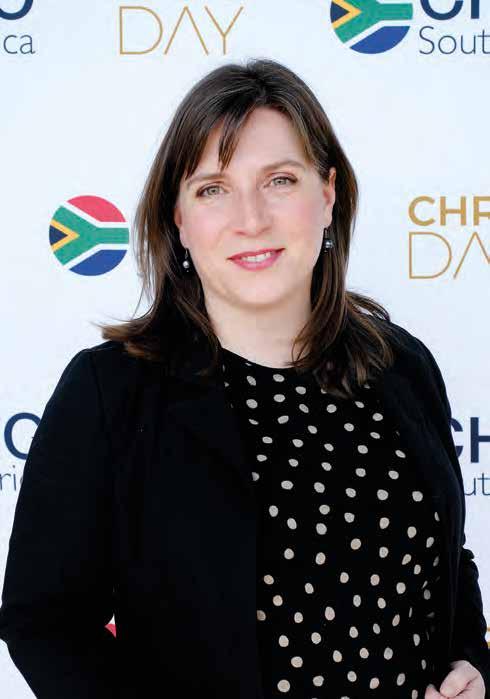
6 minute read
The making of a great CFO
Becoming a CFO can be a daunting task in the face of intimidating economic prospects, disrupted supply chains, a world of work that has evolved rapidly over the past few years, and even more change on the horizon. Nicola Mawson spoke with Deloitte South Africa’s finance and performance leader Siliziwe Mafika about how CFOs can transition into their roles to take on these challenges.
Between August last year and this year, Deloitte facilitated 10 Transition Labs, working with top South African CFOs to understand what keeps them up at night and what is expected of them from their most important stakeholders, such as staff, the executive committee, shareholders, and the board. Since inception in 2012, more than 100 Labs have been facilitated, Deloitte South Africa finance and performance leader Siliziwe Mafika notes.
Advertisement
Siliziwe explains that, when a CFO enters his or her office for the first time, they need to go through a process to understand what the job entails, and how to plan for it, which is where the Labs assist. During the past year, Deloitte helped shape CFOs from the consumer and retail sector, the financial services industry, as well as telecommunications, media, and technology, aiding each in grappling with their role in the changing environment and how they need to help steer the ship by shaping strategy. “We have had at times, instances in which CFOs arrived at their desk with a list of things they think they need to do, while what is actually expected of them are activities that are miles away.” During the Transition Labs, Deloitte unpacks aspects such as where CFOs should be spending their time, and on what tasks. CFOs also need to understand whether their team includes capable people who will align with priorities, he says. CFOs’ roles include supporting decision-making through using effective financial reporting to have insight-based conversations that speak to business performance drivers. They also need to set meaningful and impactful goals for finance staff, balance growth, margins, and investment focus. Talent retention, upliftment, and building the right team is also a main concern, as is assessing M&A transactions as a focus on acquisitions presents multiple strategic opportunities such as expanding geographic locations, diversifying operations, or capturing market share. The Labs unpack the CFOs’ current environment, and then help them succeed in contributing towards business strategy and goals. A CFO’s role, says Siliziwe, is much like that of a pit boss in a formula one race, telling the race car driver (CEO) when to change tires, come in for fuel, or take the corner to get into the lead. This involves forward-thinking and planning: what is coming next, what trend needs to be followed, what businesses should be on the radar for possible M&A activity for expansion, he explains. He adds that the CFO needs to map out the financial implications of all of this, as well as help companies pivot during crises times such as the recent pandemic, which saw an entire shift in the way business is done – from bank loans to those who lost salaries, doors having to close, and the advent of remote work.

To do this, he says, a CFO needs the right team as they cannot take all this burden upon themselves, else they will burnout, which is no good to anybody. “You can all work together and this requires focus on team members to make sure that everybody drives in the right direction to fulfil activities.”
In every team, Siliziwe says, there will be pockets of excellence among the average worker, and this excellence needs to be spread across all staff members in the unit. CFOs need self-starters who can make decisions and not have to get their permission for everyday tasks such as compiling a set of numbers, he adds. “Upskilling people and ensuring that you've got the right base for them is something that's really important.”
A CFO’s four faces
CFOs need to take on four roles: operator, steward, catalyst, and strategist. These imperatives have not changed since 2010, says Siliziwe. “The last CFO of the Year, Bongi Ngoma, who is now national head of audit at the AuditorGeneral, implemented all these aspects during her time as finance head.”
Being an operator involves basics such as transaction processing, Siliziwe explains. “It's really rolling the gears and doing the best you can with the resources you have.” Steward is when the CFO preserves the business’ assets through compliance, and internal and external reporting, he says. “This is where you find a lot of internal audit, a lot of typical accounting when it comes to Treasury, hedging, compliance, key controls, and so on.” The strategist and catalyst role is where CFOs implement strategies that not only look at their exit plan, but also, as the pit boss, identify growth opportunities and their impact on the business, as well as driving everybody towards the same outcome, says Siliziwe. An example is when the pandemic hit, and CFOs had to immediately understand the effect this would have on the company’s operations, including driving plans and allocating financial resources to the right areas. This was followed by last year’s riots in KwaZulu-Natal and Gauteng, flooding in KwaZulu-Natal, and then the Russian/Ukraine war with a myriad of supply chain and other business impacts.
A global workplace
Another aspect that Siliziwe highlights is that the boundaryless world in which everyone can work anywhere has led to staff leaving companies, across all job positions, because they can take up global positions. “Talent development and retention are currently a big challenge.” “CFOs need to have retention strategies for their team members, because, for significantly higher salaries, and, probably, better lifestyles, people can relocate anywhere, or they can still stay here and still work for other entities globally, as well.” The question then becomes how one combats that. Talent retention strategies need to go beyond compensation, says Siliziwe, and look at the culture of the team as well as giving them a purpose. At the same time, CFOs need to understand that they are human, he says, and have fears while also needing to leave behind a legacy, stamping their mark on an organisation and building a team up so that, when they leave, someone can step into their shoes. Key for CFOs is needing to build a dynamic finance team, one that is world-class. They need to consider whether this team has embraced the current digital transformation as well as work with digital disruptors, says Siliziwe. There is also a need to look at whether the team is empowered. “Can I work myself out of a job, as a CFO? And you'll see that, we’ve seen examples in the retail space where CFOs have become CEOs. What we normally ask them as well is, what was your succession plan?” Yet, says Siliziwe, many CFOs struggle with imposter syndrome, wondering if they are right for the job and have the necessary skills. “This is where the relationship between the CFO and the CEO comes in, with the CEO assuring the financial head that they have been installed in that position because they are a safe pair of hands and have knowledge that can really aid the business’ growth ambitions.” However, the buck stops with the CFO, he says. “When the company is doing well, the CEO will probably take credit. But when the company does badly or something happens with compliance, you're probably going to fire the CFO first, questioning where they were when the auditors found issues.
“When you ask CFOs what impact they would like to make, it's around having really contributed to the growth of a company and to performance targets,” Siliziwe concludes.l
Deloitte’s CFO Programme offers CFOs bold initiatives and insights for one of the toughest jobs in the world by bringing together a multidisciplinary team of leaders and subject matter specialists to help CFOs stay ahead in the face of growing challenges and demands. To find out more about this programme, contact Siliziwe Mafika at smafika@deloitte.co.za










